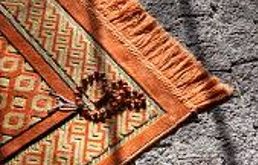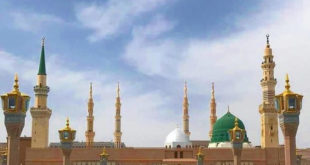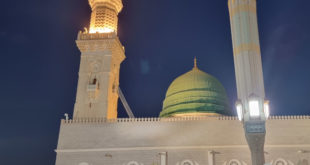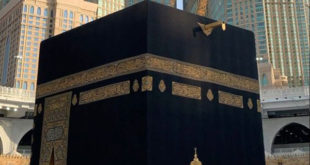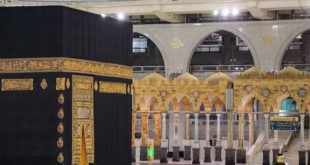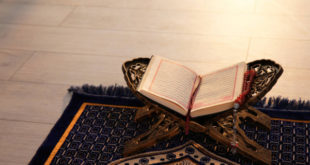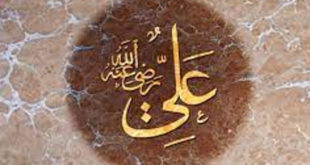عن جندب بن عبد الله الأزدي رضي الله عنه صاحب النبي صلى الله عليه و سلم عن رسول الله صلى الله عليه و سلم قال مثل الذي يعلم الناس الخير وينسى نفسه كمثل السراج يضيء للناس ويحرق نفسه الحديث رواه الطبراني في الكبير وإسناده حسن إن شاء الله تعالى (الترغيب …
Read More »Recent Posts
March, 2018
-
5 March
The Forefathers of Rasulullah (sallallahu ‘alaihi wasallam) – Part Five
Haashim (continued) Haashim was the first to initiate the custom of sending off two trade caravans a year; one to Syria in summer and another to Yemen in winter. According to this unvarying custom, a caravan would set out in every season of the year. These caravans would travel in …
Read More » -
5 March
The Humility of Rasulullah (sallallahu alaihi wasallam)
عن عائشة قالت سئلت ما كان رسول الله صلى الله عليه وسلم يعمل في بيته قالت كان بشرا من البشر يفلي ثوبه ويحلب شاته ويخدم نفسه (مسند أحمد رقم 26194) Hazrat Aaisha (Radhiyallahu Anha) was once asked: “What would Rasulullah (sallallahu alaihi wasallam) do within the home?” She replied: “He …
Read More » -
5 March
The Reality of Barakah
Hazrat Moulana Ashraf Ali Thanwi (rahmatullahi ‘alaih) once mentioned: The meaning of barakah (divine blessings) is not as many people think it to be. Many people think that barakah is for a person to acquire what he wants through merely reciting some wazifa and without making the correct effort and …
Read More » -
3 March
Azkaar after Salaah-1
After completing one’s fardh salaah, one should recite istighfaar thrice and recite the following duaa. اَللَّهُمَّ أنْتَ السَّلَام وَمِنْكَ السَّلَام تَبَارَكْتَ يَا ذَا الْجَلَالِ وَالْإكْرَام O Allah, You are salaam (i.e. Your name is Salaam) and from You is peace. You are the greatest O the possessor of honour and …
Read More »
-
The Brother-in-law of Rasulullah (sallallahu ‘alaihi wasallam)
Hazrat Talhah (radhiyallahu ‘anhu) was married to four wives. Each of his four wives was …
Read More » -
The Compass of the Hearts of the Sahaabah (radhiyallahu ‘anhum) – The Tolerance of Rasulullah (sallallahu ‘alaihi wasallam) – The Orchards of Love – Part Seventy Four
-
Tafseer of Surah Naazi’aat
-
The Extreme Generosity of Hazrat Talhah (radhiyallahu ‘anhu)
-
Securing the Blessings of Ramadhaan, Umrah and Hajj – The Tolerance of Rasulullah (sallallahu ‘alaihi wasallam) – The Orchards of Love – Part Seventy Three
-
Receiving Seventy Rewards
Hazrat Abdullah bin Amr bin Aas (radhiyallahu ‘anhuma) reported, “Whoever sends salutations upon Nabi (sallallahu ‘alaihi wasallam) once, Allah Ta‘ala and His angels will send seventy mercies and blessings upon him in return of his one Durood. Hence, whoever wishes to increase his Durood should increase it, and whoever wishes to decrease his Durood should decrease it (i.e. if he wants to earn great rewards, then he should increase his Durood).”
Read More » -
Increase in Sustenance
-
The Reward of Fasting on the Day of Arafah
-
The Angel that Stands at the Blessed Grave of Hazrat Rasulullah (sallallahu ‘alaihi wasallam) to Convey the Durood of the Ummah
-
Reciting Durood when Entering the Musjid
-
Sunnats and Aadaab of the Host – 3
3. Generosity and feeding the creation was a salient quality and attribute of all the …
Read More » -
Sunnats and Aadaab of the Host – 2
-
Sunnats and Aadaab of the Host – 1
-
Sunnats and Aadaab which every person needs to adhere to in his individual life – 9
-
Sunnats and Aadaab which every person needs to adhere to in his individual life – 8
-
Hazrat Ali (radhiyallahu ‘anhu) – Part Forty-One – Being Sent by Rasulullah (sallallahu ‘alaihi wasallam) to Level the Graves, Destroy Idols and Erase Pictures
Hazrat Ali (radhiyallahu ‘anhu) reports that on one occasion, Rasulullah (sallallahu ‘alaihi wasallam) attended a …
Read More » -
Rasulullah (sallallahu ‘alaihi wasallam) Approving of the Verdict of Hazrat Ali (radhiyallahu ‘anhu) – Part Forty
-
The True Ulamaa – Hazrat Ali (radhiyallahu ‘anhu) – Part Thirty Nine
-
Du‘aa for Assistance in Settling Debts – Hazrat Ali (radhiyallahu ‘anhu) – Part Thirty Eight
-
The Concern of Hazrat Ali (radhiyallahu ‘anhu) regarding Business being Conducted According to the Islamic Principles – Part Thirty Seven
 Ihyaaud Deen An Effort to Revive Deen in Totality
Ihyaaud Deen An Effort to Revive Deen in Totality




